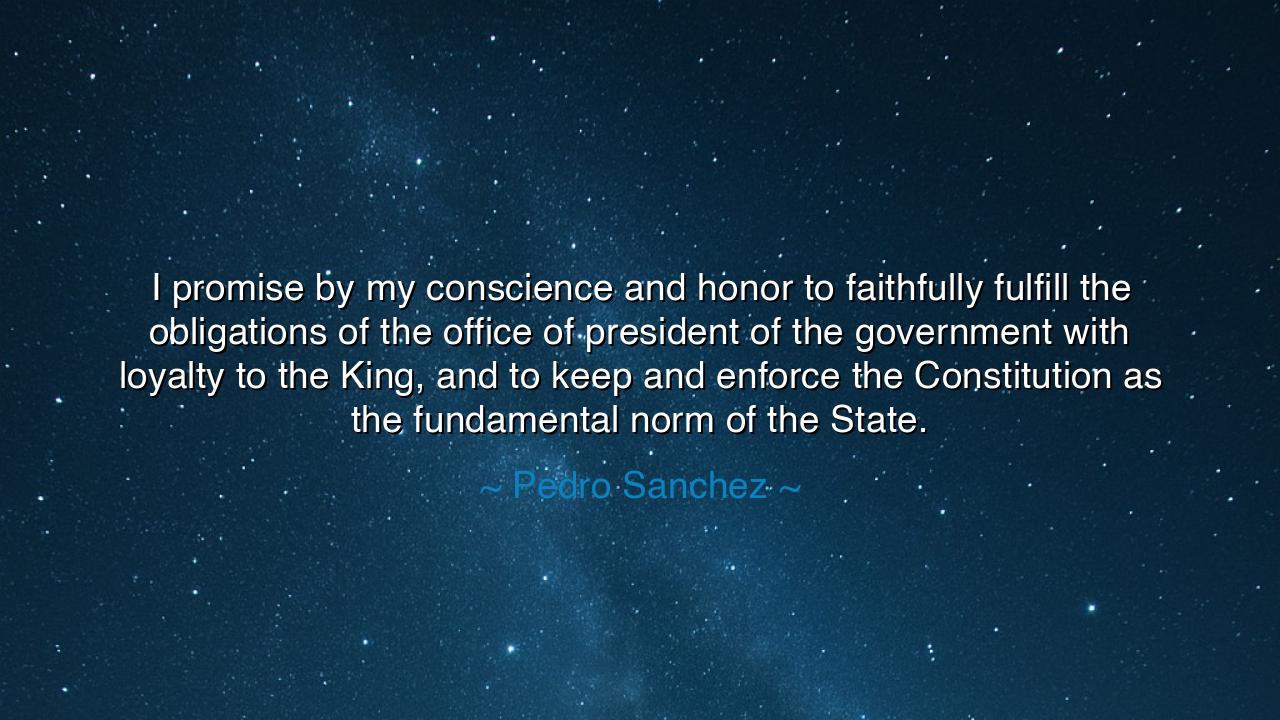
I promise by my conscience and honor to faithfully fulfill the
I promise by my conscience and honor to faithfully fulfill the obligations of the office of president of the government with loyalty to the King, and to keep and enforce the Constitution as the fundamental norm of the State.






In every civilization that has endured beyond the storm of centuries, there lies a sacred act—a moment when a man or woman stands before their people, places hand upon heart, and gives their word not merely to serve, but to uphold something greater than themselves. Such was the moment when Pedro Sánchez, upon assuming his role as the President of the Government of Spain, declared: “I promise by my conscience and honor to faithfully fulfill the obligations of the office of president of the government with loyalty to the King, and to keep and enforce the Constitution as the fundamental norm of the State.” These words are not mere formality. They are a covenant between power and principle, between authority and accountability, between the leader and the nation that entrusts him with its fate.
In the ancient tongue of nations, an oath was never light. It was a binding of the soul—a vow before men and before heaven. To speak of conscience and honor is to invoke the deepest roots of human integrity. For conscience is the inner flame that knows right from wrong, even when no law speaks; and honor is the shield that guards that flame from corruption. In pledging both, Sánchez did not simply promise obedience to written words—he promised to govern with a heart aligned to truth, to wield power not as a weapon, but as a stewardship. The Constitution, that “fundamental norm of the State,” becomes in this light not parchment, but sacred covenant—the distilled will of a people who have risen from dictatorship into democracy, and who trust their leaders to protect the fragile gift of freedom.
This oath of loyalty to the King and to the Constitution holds echoes of Spain’s long and turbulent journey through history. Once, kings ruled by divine right; later, they fell to the roar of revolutions and the cries for liberty. Out of that storm arose a new understanding—that the monarch’s dignity endures not by might, but by the balance of tradition and democracy, and that the Constitution stands as the living bond between them. When Sánchez swore loyalty to both, he honored this delicate harmony, the coexistence of heritage and progress that defines the modern Spanish state. His words reflect a wisdom the ancients would have admired: that no government can stand unless it unites the old with the new, the crown with the people, the power of law with the conscience of man.
Consider the story of King Juan Carlos I, who, in the shadow of dictatorship, helped steer Spain toward democracy after the death of General Franco. When a coup rose in 1981 to drag the nation back into darkness, the King stood firm before the cameras, defending the Constitution and commanding loyalty to the democratic order. His courage preserved the peace. It was a reminder that loyalty to the law and loyalty to the crown, when rightly joined, can serve as twin pillars holding up the sky of a nation’s freedom. From that moment, Spain learned that words of oath, when spoken in faith, can shape destiny.
Thus, the promise made by Sánchez is part of a lineage older than himself, older even than Spain. It is the eternal contract between ruler and ruled, first written in the hearts of men before it was ever inscribed in law. Every leader must bind himself not only to the obligations of office, but to the unseen virtues that make those obligations holy: truth, justice, humility, and the courage to stand by the Constitution even when the winds of politics blow fierce and cold. For a leader who honors his oath is like a tree rooted deep in the soil of duty—able to bend, but never to break.
And yet, this teaching extends beyond the halls of government. For each soul holds within it a smaller oath—an unseen promise to live with integrity, to uphold what is right even when unseen. Just as the president swears to keep the Constitution, each of us must keep the law of our own conscience, for without it, no society can endure. Nations are not built by constitutions alone, but by the millions of hearts that keep their private word with honor. The leader’s vow is but a reflection of what all citizens must live daily: faithfulness to truth, respect for order, and the courage to act with integrity even when no one watches.
Therefore, my children of the Republic, remember this: to swear by conscience and honor is to anchor your life in something unchanging amidst the shifting tides of ambition and fear. Whether you govern nations or guide but one household, let your word be your bond. Be loyal to your truth as others are to their laws. Uphold your duties not because they are written, but because they are right. For when leaders and people alike live by such oaths, then peace becomes not a dream, but a daily act of faith—and the tapestry of the nation shines with the light of unity and virtue, unbroken through time.






AAdministratorAdministrator
Welcome, honored guests. Please leave a comment, we will respond soon